Funding blow
Chancellor ignores school cash crisis. See page 4.
Influencing change
NEU Leadership convention. See page 10.
The magazine for NEU Leadership members
Support network
Coach Viv Grant on developing skills for effective leadership
Maternity Matters



Supporting members after pregnancy loss. See page 19. Spring 2024


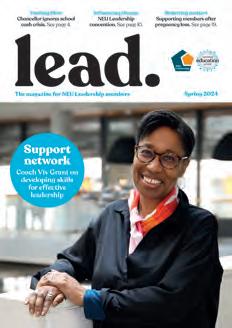
Lead.
Spring 2024
Viv Grant explains the benefits of coaching for leaders (see page 15)
Photos: Sarah Turton
NEU president: Emma Rose
NEU general secretary: Daniel Kebede
Editor: Sally Gillen
Editorial assistant: Frankie Faccion
neu.org.uk facebook.com/ nationaleducationunion twitter.com/NEUnion
Published on behalf of NEU by James Pembroke Media, 90 Walcot Street, Bath BA1 5BG jamespembrokemedia.co.uk
Senior editor: Lizzie Hufton
t: 01225 337777
e: lizzie.hufton@james pembrokemedia.co.uk
Design manager: Christina Richmond
To advertise contact: t: 020 7880 7614
e: lead-magazine@ redactive.co.uk
Ad artwork coordinator: Aysha Miah-Edwards aysha.miah@redactive.co.uk
Except where the NEU has formally negotiated agreements with companies as part of its services to members, inclusion of an advertisement in Lead does not imply any form of recommendation. While every e ort is made to ensure the reliability of advertisers, the NEU cannot accept any liability for the quality of goods or services o ered. Lead is printed by Swan Print.
IN March, I had the opportunity to spend time with some of the union’s passionate and ethical leaders at our NEU Leadership convention in London (see page 10).
Ofsted was, of course, high on the agenda.
As we know, new chief inspector Martyn Oliver arrived in January with promises to make significant changes. He had little choice. The mounting criticism of Ofsted culminated at the end of last year with a coroner’s conclusion that the toxic inspectorate had played a part in the suicide of head teacher Ruth Perry, one of our members.
The media coverage of Ruth’s death has led many outside our profession to question Ofsted’s processes and power. So when Martyn Oliver arrived in January, it was with an air of new year, new chapter for the inspectorate. A raft of proposed changes emerged almost overnight. But members are, understandably, sceptical.
That’s hardly surprising when you consider that Ofsted has already ignored recommendations by the NEU-sponsored Beyond Ofsted inquiry, and MPs on the Education Select Committee, that it should scrap hugely damaging, entirely unhelpful single-word judgements (see page 6). If Ofsted hasn’t listened to them, why would leaders be optimistic that the inspectorate’s Big Listen will be anything more than a PR exercise?



As former head Siobhan Collingwood pointed out at the convention, leaders and teachers are still working within the same Ofsted framework and high-stakes accountability system. “No matter how hard they smile at us, they are still kicking us,” she said.
The applause from the audience said it all.
Ofsted must go. Let’s make it happen.
Thank you, as always, for all you do for your staff and students.
Daniel Kebede General secretary National Education Union
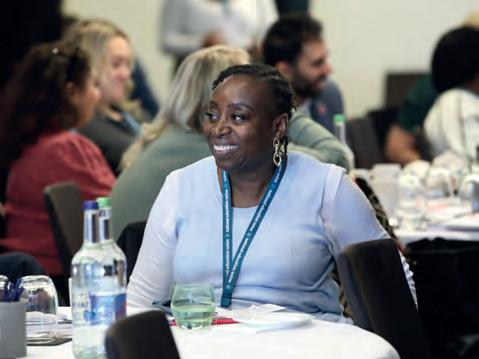
10


Regulars
4 Update Budget disappointment; TUC women’s conference
22 Final word Daniel Kebede on the funding crisis in schools and colleges








Features
9 Interview Teacher and author Helen Daniel on understanding children with sensory di erences
10 NEU Leadership convention
Inspirational speakers, workshops and debates on the big issues –all on the theme of influencing change
15 Interview Executive coach
Viv Grant explains how understanding their behaviour can help heads become better leaders
19 Maternity matters
Improving support for educators a ected by pregnancy loss
lead. The magazine for NEU Leadership members 3
Welcome
Contents 7 19
pointed
Chancellor opts for tax cuts rather than cash for schools and colleges
NEU general secretary Daniel Kebede slammed the Government for failing to put its money where its mouth is by ignoring the education funding crisis in its spring Budget.
Commenting on Chancellor Jeremy Hunt’s statement on 6 March, Daniel said: “He has turned his back on the teacher and support staff recruitment and retention crisis, the record class sizes, the decrepit state of our school buildings.
“Jeremy Hunt says he wants a high-skills, high-wage economy but he has failed to deliver what he says the country needs. The inescapable fact is that 70 per cent of schools have less funding in real terms than in 2010.”
“The inescapable fact is that 70 per cent of schools have less funding in real terms than in 2010.”
The Chancellor announced £105 million for special free schools, but plans to cut capital investment in education from next year.
“While Government ministers
spout platitudes about excellence, our schools and colleges have to deal with the consequences and so do the nation’s children,” added Daniel. “This Government has no strategy to solve the problems in our schools and colleges or close the disadvantage gap for pupils. Child poverty has grown on its watch.
“This is the desperate last hurrah of a Government seeking to buy votes before a General Election with tax cuts and perks for their friends, rather than doing what is right for our children. Anything less than serious additional investment in schools and colleges is a betrayal of parents and young people, as well as of educators.”
See Daniel’s final word on page 22
Union submits evidence to the School Teachers’ Review Body calling for urgent pay restoration after 14 years of austerity
THE union has submitted overwhelming evidence to support its call for a fully funded, aboveinflation pay rise for leaders and teachers this year.
In its submission to the School Teachers’ Review Body (STRB) in February, the NEU set out the impact of 14 years of austerity economics on pay.
Findings from our latest pay and progression survey, which was completed by almost 24,000 members, reveals the impact of pay cuts on recruitment and retention and is included in the evidence.
A teacher who started working in 2010 and made normal progress up the pay scale has lost over £79,000 in real terms. Figures published by surveying app Teacher Tapp show a 42 per cent increase in the number of teachers taking second jobs.
The union says in the submission to the STRB: “No credible analysis can deny the impact of pay cuts on recruitment and retention. We call on the STRB to engage with the clear evidence and to make recommendations for the urgent pay restoration that is manifestly required.”
Alongside the real-terms pay cuts, teachers’ take-home pay has also taken a hit as a result of increased pension contributions. They went up 6.4 per cent to an average 9.6 per cent from April 2014, and soon after teachers faced years of pay freezes and pay caps.
NEU general secretary Daniel Kebede said: “The Government attacks on teacher pay have caused major damage to the relative value of teacher pay against other professions,
contributing to the critical and widespread recruitment and retention problems. Teacher shortages hit our education service hard, so failing to address them impacts parents and pupils as hard as teachers and school leaders.”
“Figures published by Teacher Tapp show a 42 per cent increase in the number of teachers taking second jobs.”
lead. The magazine for NEU Leadership members 4 Update
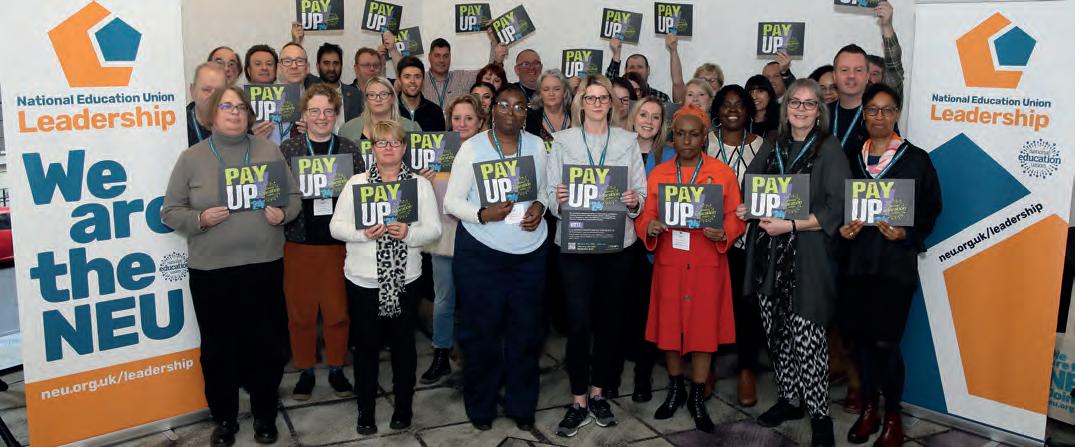
Union holds indicative pay ballot over fears of a paltry pay offer for teachers this year
AS Lead went to press, the results of the union’s preliminary electronic ballot on pay and funding were due to be released.
The union’s ballot of teachers at maintained schools and sixth forms in England and Wales ran between 2 and 28 March.
We asked two questions: do you agree that you should receive an aboveinflation pay rise for 2024/25? Would you vote YES to strike action for a fully funded, above-inflation pay rise that constitutes a meaningful step towards a long-term correction in pay, and further funding to provide improved levels of staffing provision in schools, colleges and education services?
The union’s national executive recommended members vote YES to both questions.
Teachers and support staff in Wales were also asked if they would be prepared to take action on Government plans to reduce the summer break to four weeks.
A preliminary ballot for support staff also opened on 16 March. It asked two questions about the NJC unions’ pay claim and associated action. Do you support the NJC unions’ 2024/25 above-inflation pay demand? Would you vote YES to strike action alongside NJC unions in support of
their 2024/25 pay demand?
The ballot also asked if support staff members would take strike action alongside NEU teacher colleagues for further school funding.
NEU general secretary Daniel Kebede said: “Gillian Keegan’s approach to this year’s pay review is nothing short of insulting. Having promised a timelier process than for 2023/24, she has done nothing but delay. Her remit letter to the School Teachers’ Review Body was weeks late, and she also missed the deadline for evidence. There is no reason to suppose the Education Secretary has changed her tune since last year.”
He added that there was every indication the Government would be unwilling to offer more than one or two per cent in the next pay round, so members should be on alert that action may be necessary to ensure a proper pay and funding offer for teachers.
“Rather than allow the Government to undo the gains of last year, the NEU will seek to push forward in its campaign for a long-term correction on pay,” he said.
The union is clear that last year’s
pay rise of 6.5 per cent –originally the Government had offered just three per cent – was only secured by the eight days of strike action taken by members. Head teacher Michael Farrelly, who is based in Wirral, voted YES. He said: “Last year we accepted the Government’s offer on the proviso it was a stepping stone. We accepted that any pay increase would be properly funded. Since then, however, the Government has failed to fully fund the pay increase and is planning to take our pay, and hard-won gains, backwards with a disrespectful one or two per cent increase for 2024/25.
“Gillian Keegan is asking for sustainable pay rises, against the backdrop of unsustainable workloads, working conditions, crumbling buildings and a recruitment and retention crisis. Once again, we as teachers need to stand up for the children, and as leaders, the schools and communities we are charged to lead. Last year, teachers knew they had to stand up in order to get the respect and remuneration they deserve for their work. It’s time for NEU members to step up once again.”
lead. The magazine for NEU Leadership members 5 Update
Leaders at this year’s NEU Leadership convention showed their support for the PayUp 24 campaign urging members to vote in the preliminary ballot. For full coverage of the convention see pages 10-13
Support grows for campaign to replace toxic inspectorate
LEADERS were among members at this year’s NEU annual conference in Bournemouth who debated a motion calling for Ofsted to be abolished.
The union is campaigning for the toxic inspectorate, cited in coroners’ reports into the deaths of ten teachers in the past 25 years, to be replaced. We have produced a risk assessment for leaders to use ahead of an Ofsted inspection.
New chief inspector Martyn Oliver, who took over from Amanda Spielman in January, has promised a range of changes, following the part Ofsted played in the suicide of primary head teacher Ruth Perry in 2023. A coroner’s report published last December concluded Ofsted’s rating of Ruth’s primary school as Inadequate contributed to her death.
But despite the promised changes, members continue to report bad experiences to the union, and those who attended the NEU Leadership convention on 8 March (see page 10) remain unconvinced that Ofsted’s reforms will lead to permanent and positive change.
The inspectorate failed to address the issue of single-word judgments when it published a response to a report by MPs on the Education Select Committee that said Ofsted should develop an alternative to such blunt verdicts.
NEU general secretary Daniel Kebede said there would be “real disappointment and consternation” at such a glaring failure.
“The single-word judgements have a
deeply detrimental impact, including too much pressure on individual leaders,” he said. “It is not going to be possible to keep, and attract, enough talented school leaders without change to this narrow aspect of the system.”
At conference, members debated a motion calling on the union’s national executive to lobby parliamentary candidates ahead of the next General Election to endorse the union’s campaign to replace Ofsted and to consider the recommendations from the NEU-sponsored Beyond Ofsted inquiry to develop a viable alternative to school accountability.
The motion also called on the executive to support members in balloting for and taking action where ‘mocksteds’ and deep-dives and excessive workload have been generated by Ofsted pressures.
The union is calling on leaders who work as Ofsted inspectors to step down, and to remove references to Ofsted from all banners, letterheads and websites.
For more on the risk assessment, visit neu.org.uk/campaigns/replace-ofsted/ ofsted-risk-assessment-guide
Call to sign up to SATs manifesto
JOIN hundreds of school leaders in calling for SATs to be paused and for an independent review into primary assessment and accountability.
The NEU is urging leaders to sign up to coalition More Than a Score’s SATs: Manifesto for Change.
SATs are reductive, expensive at £47 million a year, and do not have the confidence of the profession or parents.
The high-stakes tests label 41 per cent of children as failures just as they are about to start secondary school.
The manifesto calls for an alternative to statutory assessment, with ongoing, low-stakes assessment, which we know is highly effective and supports children’s learning.
actionnetwork.org/ forms/sats-manifestofor-change
Continuing professional development for leaders
17 April
3.45-5pm
Surviving and thriving in middle leadership: research-based practical approaches for wellbeing
Explores the unique challenges to those in middle leadership. It will cover values and purpose, modelling, understanding others and building positive networks of support. All in relation to wellbeing and self-care.
8 May 4-5pm
Leaders: courageous conversations
This webinar explores the consciousness, confidence and competence leaders need to develop in order to lean into the courageous conversations they often want to avoid.
15 May 3.45-5pm
Leaders: building a culture of inclusion and effective deployment of support staff
During this webinar, leaders will discuss whole-school approaches to SEND, how to build a culture of inclusion, and provide up-to-date information and research on SEND.
For more information and booking, go to neu.org.uk/national-cpd
lead. The magazine for NEU Leadership members 6 Update
Members speak on issues including the menopause and period poverty
A 14-STRONG NEU delegation attended this year’s TUC women’s conference (6-8 March) in London, where members spoke on a range of issues including the menopause, ending male violence against women and girls, sexual harassment, period poverty and maternal healthcare.
Speaking on better support for women during menopause, NEU member Julia Roberts told the conference that leaders and line managers should undertake training. Research has shown that 87 per cent of teachers in menopause are unable to take a break, if needed, and 73 per cent cannot access any means of cooling down.
All workplaces should have menopause policies, Julia added, highlighting the NEU’s menopause policies and resources.
Member Holly Williams addressed conference on the impact of period poverty on school absence, citing research by phs Group in its period equality report that found girls miss more school days because of periods than colds. She went on to say that while the union welcomed the Department for Education’s period product scheme, launched in 2020, boxes of products were sitting in cupboards because girls are not requesting them. Instead, she said, an allowance should be given to families to purchase them. “Access
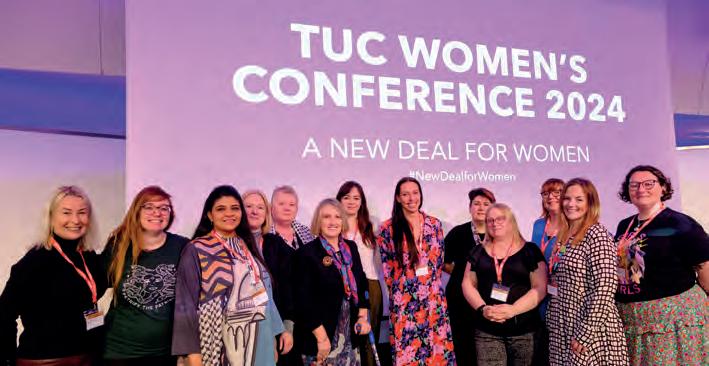
NEU members at the TUC’s women’s conference in London spoke on a range of important issues
to period products should not be a barrier to education,” said Holly, adding that the Government’s £15 million hubs to boost attendance had not recognised the effect of period poverty on absence.
Holly also spoke about the prevalence of sexual harassment in schools, highlighting research published by the union showing a third of female students at mixed schools have experienced harassment. The union has produced a toolkit, It’s not ok, to help schools and colleges tackle the problem.
Chair of the NEU’s women’s organising forum Mairéad Canavan
spoke on a motion to end violence against women and girls, describing it as “one of the most prevalent human rights violations, taking place, many times over, in every corner of the globe”.
The NEU also proposed a motion calling on the TUC to campaign for robust research into the impact of poor maternal healthcare on working women, including racial disparities and single mothers’ experiences. It also called for a right to paid Keeping in Touch days, bespoke return-to-work induction and support for new mothers, and subsidised, safe, high-quality childcare.
The NEU hosts a fringe session on Maternity Matters
THE NEU ran a fringe on the union’s Maternity Matters resources, with a panel including Mairéad Canavan, chair of our women’s organising forum, and NEU’s senior vice-president Sarah Kilpatrick. They talked delegates through the NEU’s Maternity Matters journey, from a 2021 annual conference motion that led to our maternity rights survey of 3,700 members.
From members’ feedback, the NEU has produced five sets of resources and advice: being pregnant at work;
pregnancy loss or termination; maternity leave and pay; breastfeeding and returning to work; and flexible working.
Delegates shared their own experiences, with some reporting that women were being discouraged from using the “beautiful policies” in their workplaces, or aren’t aware of their rights.
A motion on childcare, which promoted many of the issues highlighted in the NEU’s Maternity Matters call to action, was passed.
They include increased rates for all types of parental leave; improvements to all aspects of statutory maternity leave and pay; rights to flexible working; and improving the return to work.
See page 19 for more on the union’s new resources and advice on providing support for women who have experienced pregnancy loss. Visit neu.org.uk/advice/your-rights-work/ family-rights/maternity-rights for a range of guidance on maternity issues.
lead. The magazine for NEU Leadership members 7 Update
Photo: Jess Hurd
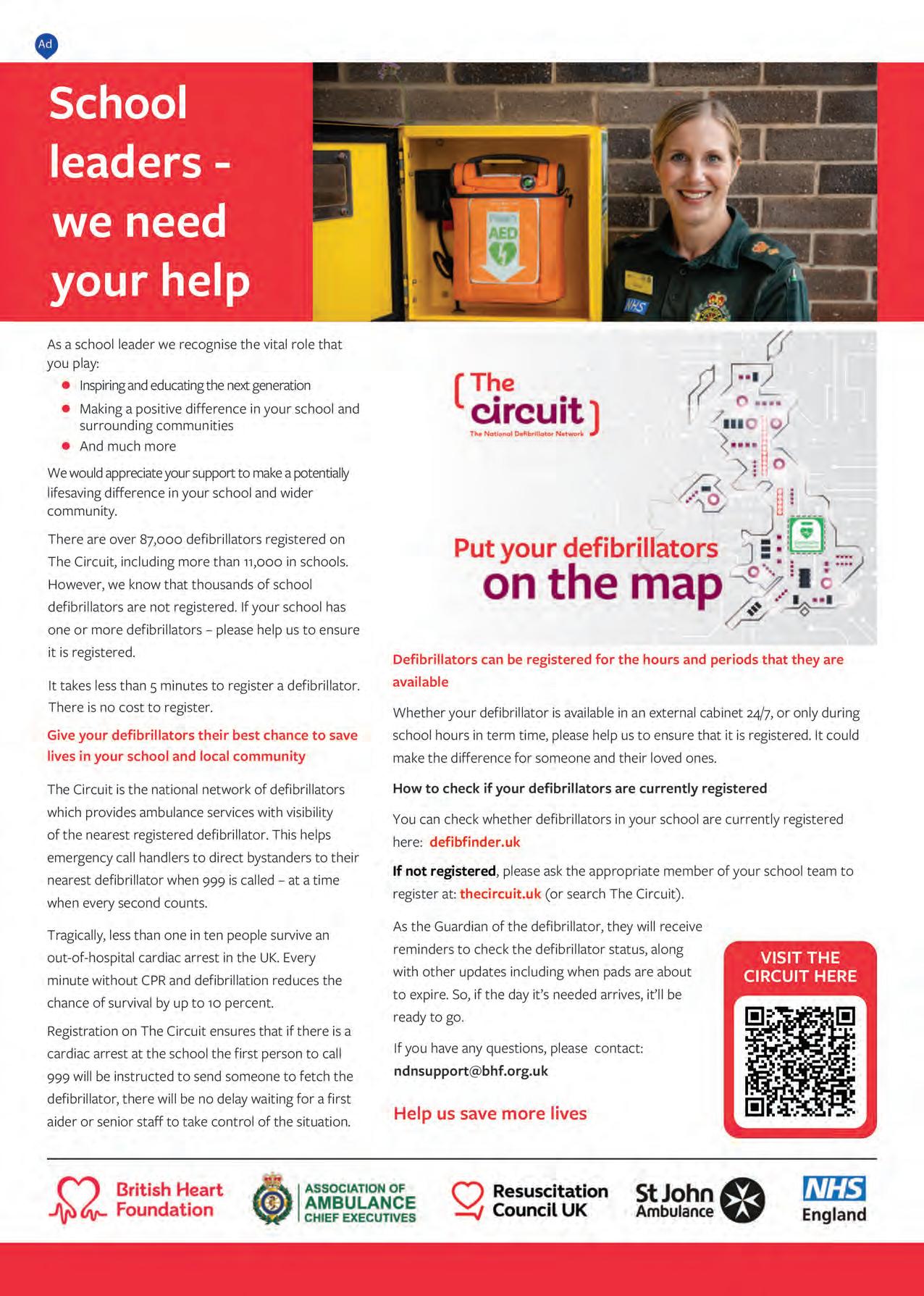
Understanding children with sensory differences
Helen Daniel was studying neurodivergence when she was diagnosed herself. She tells Sally Gillen that rather than trying to change behaviour, schools need to become more accessible.
JUST before Covid-19 hit in 2020, Helen Daniel, then a primary teacher, had started a master’s degree in autism studies. Her interest in it came from being a member of a neurodivergent family. It wasn’t until partway through her course that she, too, was diagnosed with ADHD with autistic traits.
It was a “lightbulb moment,” says Helen, who was also diagnosed with dyslexia, dyspraxia, hypermobility and dyscalculia.
“At school, I found it very challenging to tune into what the teacher was saying and to focus on the resources,” she says. rough her studies, she discovered that people with ADHD process auditory information in a di erent way. “ at explains why I had found it so hard to tune into voices,” she says. “If a teacher just talked through a PowerPoint, as soon as the last slide was gone it was out of my brain. I couldn’t memorise, so when it came to the assignment, I would think why can’t I do what Jane next to me is doing? I was often told to stop talking, to be quiet, but actually how I process information is by talking.”
Looking back, Helen believes an early diagnosis would have helped, but there is every chance she would not have received the support she needed. Years later, that hasn’t changed, as many neurodivergent children are not receiving the right support in schools.
Many have sensory di erences, but that is not well understood in mainstream schools, argues Helen. “We have children in the classroom who are accessing resources di erently and there are lots of things we can put in place to support






In her research she coined the phrase neurosensory divergence, which she explores in her bestselling book Neurosensory divergence: autistic languages – A roadmap to an equitable life for autistic children.


their learning, language development and the way they communicate,” she explains. “Schools really need to be thinking about how they can bring sensory accessibility into the classroom. Resources don’t have to be costly. Anything that helps with reminders, to assist children with retaining the information, can help.
“We should also have non-speech-based resources in playgrounds. Beyond a certain age, we don’t have things like skipping ropes, but they take the pressure o children who nd speech more challenging.”
Helen adds that leaders should make sure they are talking to the whole school community about sensory di erences – in assemblies, by having books and resources in libraries, maybe even having a personal, social, health and economic education lesson around sensory di erences.
“Targets, exams and assessments are based on a polytropic brain and sensory system. Our schooling system has become so narrow and there are many children who aren’t served by the way we are teaching them,” she explains. “We are telling them they aren’t achieving the expected targets, but those targets are set around children who don’t have sensory di erences.”
have sensory di erences.”
Instead of recognising these sensory di erences, which may mean a child struggles with busyness and noise, or overpowering smells, the focus too often is on changing behaviour.
Children are expected to sit down, be still (di cult for a child with ADHD), pay attention to resources they can’t access, go into a playground they aren’t supported in, and when they get overloaded, are often told to be more resilient, she says. ere is no understanding that the situation they are being put in is untenable.
“We say they are not resilient, but actually these children are some of the most resilient, because they are dealing with so much. Understanding that is enough to start change,” she adds. “It is heartbreaking to see children still struggling, as I did.”
You can contact Helen via outsidetheboxsensory.com
lead. The magazine for NEU Leadership members 9 Opinion
Helen Daniel has written a book on support for autistic children
NEU Leadership convention
Change makers

99% of delegates rated the conference good or excellent
Gathering in London for the annual NEU Leadership convention on 8 March, themed this year around influencing change, delegates heard from inspirational speakers, discussed the big issues including Ofsted reforms and funding, took part in workshops and enjoyed a day of networking.
Photos: Sarah Turton Words: Sally Gillen
There is hope for the future if we work together to do things differently, says speaker Viv Grant
KEYNOTE speaker Viv Grant kicked o the day with an inspiring talk on how leaders can rediscover their “vocational vitality” after living in an “educational swampland” under a Conservative government for 14 years.
An executive coach who works with head teachers, and a former primary head herself, Viv told the conference that educators had been su ocated. “We have had our hands tied behind our backs and we haven’t been able to y. We haven’t been able to truly let our young people y,” she said. “It’s as though we are waiting for a General Election and things to change.”
She went on to say that the fragmentation of the system, partly created by academisation, the stripping of resources from local authorities and the loss of autonomy for school leaders, had contributed to an internal disconnection within many leaders, which in turn had a ected how they relate to others. at psychological and emotional disconnection had been created by having to privately compromise on what they believed in professionally, in order to retain public compliance, she said.

“ at hurts and the impact is that individuals do not feel safe internally, which impacts external relationships,” Viv explained. “We need to recognise that education su ers when external accountability perpetually trumps internal discovery. I know that from every school leader I have coached.”
Urging leaders to take up the invitation to do things di erently when the new
dawn arrives, hopefully with a change of government later this year, she said: “ e future has to be di erent.”
During the Q&A that followed, former head teacher and NEU executive member Siobhan Collingwood responded: “It strikes me we have all been involved in this cognitive dissonance on a deep level for a long time and it is making us ill, and it is making our education sector ill. at’s one of the reasons why children are voting with their feet, and we are seeing growing problems in terms of attendance.
“It feels like if we start healing ourselves as leaders, we will stop making our schools ill. We will stop making our sta ill. We will stop making our children ill. We will have to be brave enough to do it.”
Viv agreed, adding: “We have normalised dysfunction. I think the answer is found in how you organise yourselves collectively. All of you in the NEU are in a fundamental position to help change the narrative, so we don’t go back to the same old ways of being.”
See page 15 for an interview with Viv
lead. The magazine for NEU Leadership members 10
Viv Grant kicked off the conference speeches
NEU Leadership convention

Daniel
Kebede: school leaders can help us win better
NEU general secretary Daniel Kebede addressed the convention in the afternoon, telling members they are, as leaders, in a unique position to elevate this year’s pay and funding campaign.
“I am so proud of the union’s campaign on pay and funding. We made a huge difference last year,” he said. “The union’s national executive recognises that there isn’t a choice but to go again this year. We can be a union that doesn’t do anything and just manages decline or we can try and make an intervention.”
To murmurs of agreement, Daniel said the Government, and Education Secretary Gillian Keegan, were out of touch with what’s happening on the ground.
“One week Gillian Keegan is banning mobile phones, the next increasing parental fines for student absences, consistently looking for a quick fix without dealing with the real crisis facing our schools and colleges,” he said.
The Government is selling education short on pay, workload and the teacher shortage, all underpinned by the chronic funding crisis. The Government’s own office says it is spending just a third of what it should be on the school estate.
“They aren’t listening, and they aren’t investing properly. Our School Cuts website shows that 70 per cent of schools have less funding in real terms than in 2010,” he said. “The UK is spending as a proportion
funding
of gross domestic produce just 4.2 per cent, when the OECD average is five per cent. To get to the five per cent average that would require a £20 billion uplift. I’m sure every one of you could spend that money.”
Daniel went on to say that the spring Budget on 6 March had been shocking, with only health funding ringfenced, and the rest of the public sector expected to find a one per cent cut every year.
“It is horrific and we all know that,” he said. “As leaders, you are in a unique position to elevate our pay and funding campaign. We absolutely must push for a Government that views children as an investment in the future, rather than an economic burden. Thank you for all you’re doing and for being members of the NEU.”
“We can be a union that doesn’t do anything and just manages decline or we can try and make an intervention.”
Leaders sceptical of Ofsted reforms
LEADERS are unconvinced by Ofsted’s promises to reform, it emerged during a Q&A session with NEU general secretary Daniel Kebede.
Recently retired London head Alyson Dermody-Palmer said that “abolition is the way forward, not reform”, while NEU National Leadership Council member and senior leader John Connolly added, “Ofsted does need to go. It can’t do its job properly”. Others described the toxic inspectorate’s proposed changes as “window dressing”.
Head Michael Farrelly prompted laughter as he compared Ofsted to a cheating partner trying to make amends after being caught out. “It’s coming up with flowers and chocolates and promises everything’s going to change, but 12 months down the line, it’s not going to be alright,” he said.
National executive member and former primary head Siobhan Collingwood, who at last year’s annual conference in Harrogate had called on the profession to “bring down” Ofsted, said: “We’re doing it. The strength of our union has been part of that. Who would have thought that we could have brought that monolith down? It’s scared. It’s putting on its kind face and saying it wants to listen to us, that it really is nice and fluffy and we can trust it.”
But she went on to talk about a school she was in recently that had been inspected, where the deputy head had gone on long-term sick leave, and it was feared they would not return.
“Chief inspector Martyn Oliver is making all the right noises and he’s smiling, but if you smile when you’re kicking us, you’re still kicking us,” she said. “We are working within the same framework, within the same high-stakes accountability system, so until the forced academisation agenda and the publication of results is addressed, they are still going to be kicking us, no matter how hard they smile.”
lead. The magazine for NEU Leadership members 11
NEU Leadership convention
Coaching can help new school leaders adapt to their role

NEWLY retired head and longstanding NEU member and activist Alyson Dermody-Palmer shared a local perspective on working and campaigning in Camden, north London.
All heads in the borough are offered three free coaching sessions a year and new heads get six free sessions a year. “I think that says something about how heads are valued and the understanding of the job,” said Alyson. “Leadership is very difficult. It can
“I think that says something about how heads are valued and the understanding of the job.”
be fantastic and then, at times, awful as well.”
Urging leadership members to get more involved in the union, Alyson said they had an opportunity to help shape the NEU’s national policy.
She went on to commend to others NEU-funded research, carried out by Professor Ruth Lupton and published last year, on the experiences of what it is like to be a head teacher today.
“This document is fantastic,” she said. “The comments in it really echo my own sentiments on being a head. However, there were aspects that I absolutely didn’t love such as how people felt they couldn’t do their jobs properly. Unfortunately, the spring Budget showed us the Government has no interest in investing in education. Despite the Prime Minister saying in October 2023 that his main funding priority was education, it was a very sad day for schools on the day of the Budget. It’s truly shocking when you consider what dire straits we are in.”
Read the research at neu.org.uk/latest/ library/school-leadership-current-times
New tool for Ofsted risk assessment
A RISK assessment has been produced by the union to help leaders work with their health and safety rep to protect staff and students ahead of and during an Ofsted inspection.
Urging leaders to use the assessment tool, Siobhan Collingwood said it would help them take the initiative when they get “the call” from the inspectorate.
It is a numerical tool that allows leaders to measure risk, adding in mitigating factors, to see what can be done to reduce it.
“Staff can have a form they keep in their classroom, so if Ofsted breaches what you have required of them, it can be passed to the leadership team and you can remind the lead inspector that this was the risk assessment you discussed with them at the beginning of the inspection,” Siobhan explained.
“We have talked a lot today about how fear drives bad behaviour and affects mental health, how it drives us into being lesser versions of ourselves. This risk assessment is a tool that you as leaders can use to show that we do have strength as a union, and we don’t have to take [the pressure created by inspection] lying down.” neu.org.uk/campaigns/replaceofsted/ofsted-risk-assessment-guide
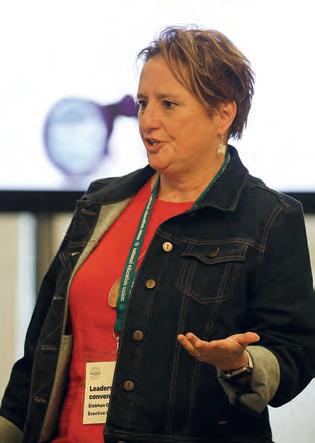
lead. The magazine for NEU Leadership members 12
Alyson Dermody-Palmer urged NEU Leadership members to take an active role in the union
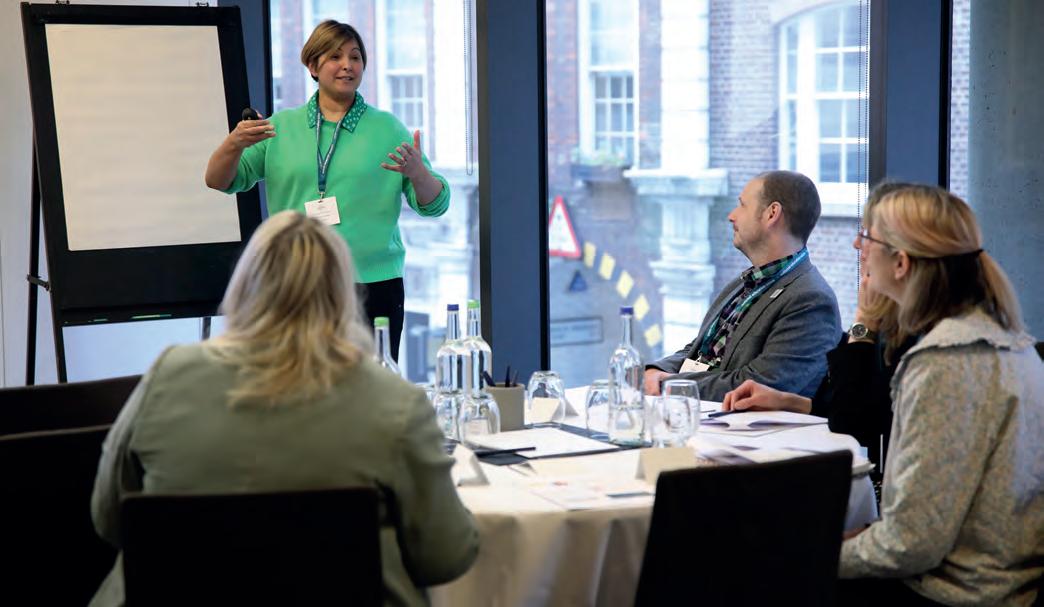
Delegates describe the ongoing challenge of teacher recruitment and retention

“We were neglecting staff… asking things of them all the time.”
A PANEL of leaders gave some insights into changes they have made at their schools. Aimee Turner, a primary deputy head in inner-city Peterborough, said her school, like many, was struggling with recruitment and retention.
Over the past 18 months senior leaders had been working with the staff to identify some of the reasons for the crisis and found that many of the “look good on paper” things it had been doing to boost staff wellbeing were not working.
“We were neglecting our staff. We were asking things all the time of them and there was never anything coming off the job list. A change in headship has made a massive difference. We have worked very closely with our NEU branch on 1,265 directed time. Some of the first things we put in place were protected leadership time for our middle leaders, protected PPA, making sure early career teacher and mentor meetings are happening regularly.”
“We asked staff over a series of meetings to look at our wellbeing offer and they came up with 55 things already in place that were ticking those boxes for wellbeing. But were they really? Were they just the things that looked good on paper?
“So we looked at what would make a difference day in and day out. They are the things we want to invest in, which include a behaviour curriculum, which we have just introduced.”
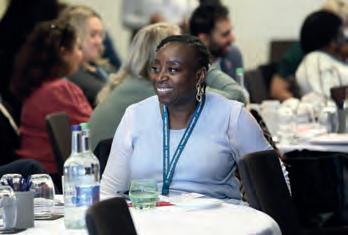
lead. The magazine for NEU Leadership members 13 NEU Leadership convention
Former primary school teacher Helen Daniel ran a workshop on teaching neurodivergent pupils in mainstream schools (see interview with Helen on page 9)
Delegates enjoyed workshops and networking
Aimee Turner talked about her school’s challenges


Learn to think differently
Executive coach and former head teacher Viv Grant explains to Sally Gillen how recognising and understanding patterns of behaviour can help struggling heads become better leaders.
lead. The magazine for NEU Leadership members 15
Photos: Sarah Turton
AS a new head, one evening Viv Grant found herself in tears.
She was 31, a new mum, and months into her first headship at a primary school in special measures.
She knew she needed to talk to someone, but who? “I couldn’t speak to the school adviser or the governors. They had appointed me and I didn’t want to seem like a failure,” she says.
In the end, she chose the school counsellor, Gill. On Friday afternoons, Viv headed to her office and spent some time just talking. “Gill just listened to me. She never gave me advice. She never judged. She just gave me space to be listened to,” says Viv, who would later go on to start her own coaching company.
“I remember I tended to have quite a negative bias. I would always focus on the things going wrong, but talking to the counsellor just gave me space to get some perspective. I see this focus on the negative a lot in the head teachers I work with.”
Twenty-five years on Viv is an executive coach, and she believes the seeds
“It’s important not to see vulnerability as a sign of weakness, not to set yourself up as a Teflon-coated superhead.”
for that career were probably planted during her struggles trying to manage the loneliness in the early days of headship.
“Looking back there was very little support – and that’s still the case for heads now – in terms of understanding the psychological and emotional changes that happen when you take on the role,” she reflects.
Coaching as a field, as well as recognition of its benefits for leaders, has grown in the past few decades, although that hasn’t necessarily been matched by a greater understanding of the level and type of support those new to headship need. This can cause problems from the outset.
“New heads will often say I’m just going to listen and observe – and that has its place – but what it can mean is they are not showing up as themselves,” explains Viv. “If you don’t have an outside voice to help you process that, what you find is you’re trying to walk in someone else’s shoes and not your own.”
In creeps self-doubt. In the right measure, that can be a positive. But too much can lead to a lack of self-belief and, in turn, new heads can think the key to success is to emulate the style of another, most likely the popular head they have replaced, the person loved by the community, staff and pupils. That is, of course, doomed to failure.
The trend for instructional coaching is not a welcome development for Viv.

lead. The magazine for NEU Leadership members 16
Interview
Viv speaking to leaders at the NEU Leadership convention in London, where she urged delegates to rediscover their vocational vitality

She sighs. “It is just telling people what to do, rather than saying I’m going to walk alongside you. I’m not the guru or the expert, but actually I can help you become an expert in your experience.”
Without the help to understand the emotional and psychological shift that takes place with becoming a head, people naturally fall back on the behaviours that helped them get to where they are.
“You spiral, or lean more into the behaviours that have got you to where you are, when you should be developing other, new qualities,” Viv explains.
We all have ‘behaviour drivers’, she adds, and hers, for example, are primarily “be strong”, with the secondary “please others”.
It’s a combination often found among heads. Driven to please others, they are team players, able to read a room and highly empathetic. Sounds ideal, and who wouldn’t want a leader like that, but the downside for the individual is that they put everyone’s needs before their own, which can lead to burnout.
Viv explains that the “shadow side” of “be strong” is that, under pressure, that person can shut down emotionally, keep others at arm’s length and become curt.
Through coaching, Viv asks questions to help leaders understand their behaviour and how they can flip it so they can become more balanced in terms of how they lead themselves and others.
Unsurprisingly, the loneliness of the role is probably the most common issue raised by heads, says Viv. “It hits everyone who takes on the role in such a deep way. The full weight of the responsibility and the loneliness combine. As a deputy you’re shielded a bit. Then when people step into the head role, it can really knock them and take them a while to find their feet.
“Another thing that comes up is the feeling of having to be all things to all people. Heads just want a space where they can take off that persona for a bit. It’s important not to see vulnerability as a sign of weakness, not to set yourself up as a Teflon-coated superhead.”
Heads are really struggling right now and Viv says she is struck by the number who just want to leave, which is why a lot of her work is around what she terms “vocational vitality”. In a nutshell, it is an approach designed to help leaders reconnect with why they joined the profession.
“New heads will often say I’m just going to listen and observe – and that has its place – but what it can mean is they are not showing up as themselves.”
“Sometimes the fire or the light goes out because of the pressure of the role. This Government has restricted creativity, it has restricted growth,” she says. “We all hope and believe that change is on the horizon – if we get a new Government – and we have to be ready to bring in a new dream.”
lead. The magazine for NEU Leadership members 17
Interview
Viv Grant believes her struggles during her first headship at a primary school in special measures had a part to play in her decision to pursue a career in coaching


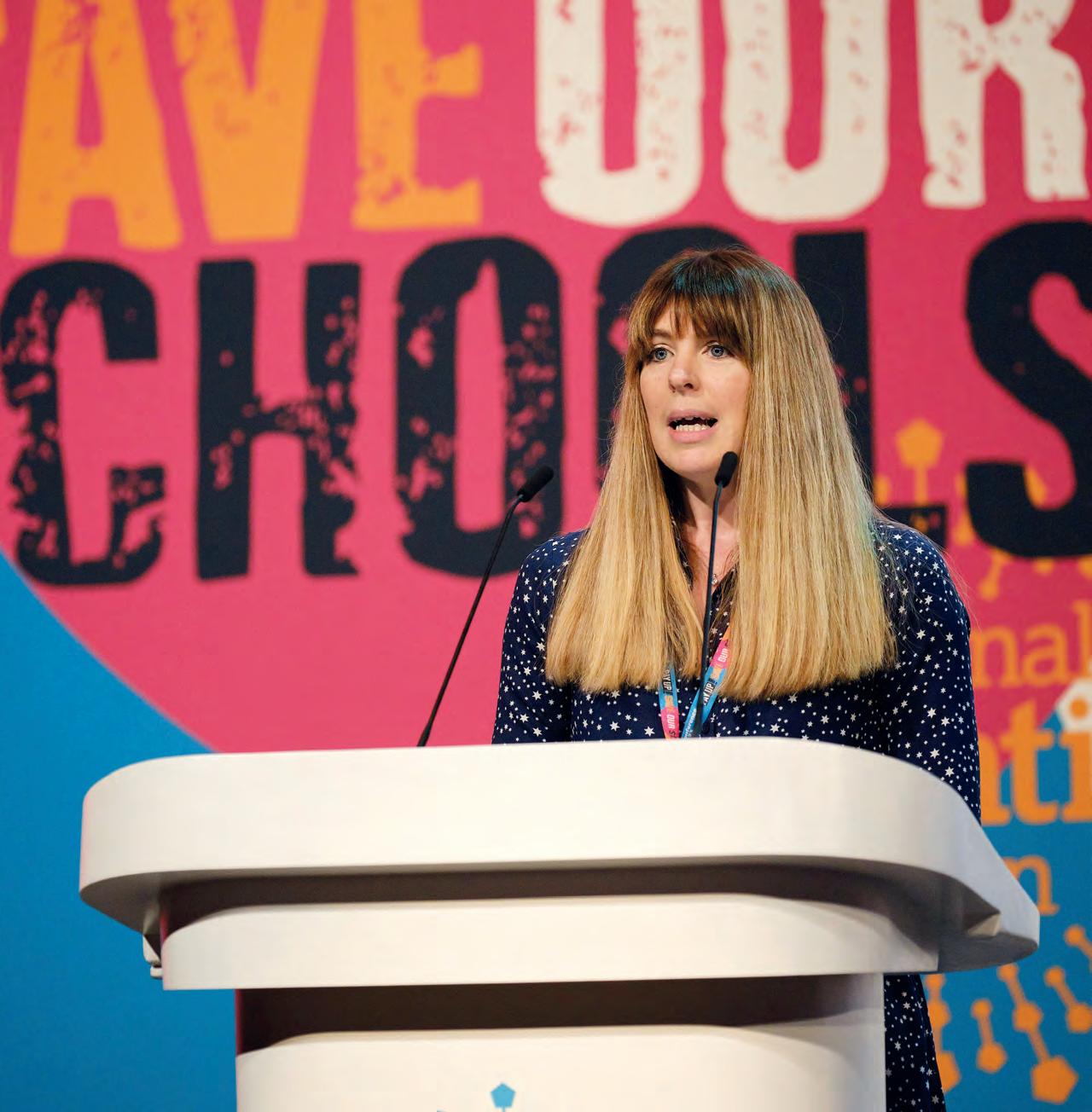
Help after pregnancy loss
Amy Kilpatrick, who was treated appallingly at work after two miscarriages, has helped create an NEU model policy for employers to improve support for those affected by pregnancy loss.
lead. The magazine for NEU Leadership members 19
Maternity Matters
Photos: Ben Broomfield Words: Sally Gillen
Maternity Matters
IN the aftermath of two miscarriages, both at 12 weeks, Amy Kilpatrick found herself on the receiving end of cruel and abusive treatment from her head teacher.
Desperately ill, she was repeatedly messaged while in hospital, called to meetings while still in surgical stockings and demoted from her position on the
“I received a text from the head, having almost bled to death, saying ‘I don’t understand why you’re not at work today. It’s ridiculous’.”
senior leadership team.
“I was rushed into hospital in the middle of the night, and I received a text from the head, having almost bled to death, saying ‘I don’t understand why you’re not at work today. It’s ridiculous’,” says Amy, who at the time was a primary school teacher in the north of England. “I later asked the head what would happen to me if I were to have another miscarriage, and she looked me straight in the eye and told me the governors would have to consider whether they would want to keep employing me.”
It was six years of hell because she had two miscarriages, adds Amy, but by the time she felt well enough to consider an employment tribunal, it was too late. Instead, she decided to take a truly awful experience, the severity of which she likens to post-traumatic stress disorder, and make sure other women didn’t suffer in the same way. “She didn’t know it, but the head had lit a fire in me,” says Amy. Her involvement in the union, which she says got her through those terrible
Pregnancy loss and termination – a checklist for leaders
• Make sure that pregnant women have access to private, clean and safe rest and toilet facilities.
• Be aware that a woman could experience an ectopic or molar pregnancy or a miscarriage while at work.
• Note that you might not be aware that a woman was expecting before she tells you that her pregnancy has ended. She is not obliged to inform her employer that she is pregnant until
15 weeks before her expected due date.
• Let your staff know that you and your leadership team will support women and parents at work who experience pregnancy loss.
• Make sure there are facilities and processes in place to protect the safety and dignity of women and parents who experience a pregnancy loss.

years, grew and she became more active in her local union branch, holding a conference in 2020, and later taking on a national role as a member of the NEU’s women’s organising forum. Amy wrote a model policy, which was later adopted at her school (the head had left by then) and then across Newcastle.
She says when she began researching workplace policies on pregnancy loss, it became clear few existed. The only employer she found that had a policy on miscarriage was Channel 4. In education, she didn’t come across any.
• Display the pregnancy loss poster in your workplace (see poster opposite).
• Share the model policy with your senior leadership team and discuss the benefits of having such a policy in place, which includes: improved awareness of the impact of baby loss; clarity on leave and pay entitlements; reassurance and improved wellbeing.
For more information, visit neu.org.uk/maternity
• Note the difference in statutory rights to leave and pay for women and parents experiencing a pregnancy loss before and after 24 weeks of pregnancy.
It was a glaring gap in a femaledominated sector. Three quarters of the union’s membership are women, many of childbearing age. With figures showing one in four pregnancies end in loss, there is a clear need for a robust policy that sets out the rights and entitlements of those affected.
The union’s maternity survey 2022, completed by more than 7,000 members, revealed an “avalanche of horror stories”, says Amy, citing cases of women continuing to teach while starting to miscarry, for example.
In response to members’ experiences, the union has produced a range of resources to help employers create a sensitive and supportive environment for women who experience pregnancy loss and termination. It includes a model policy that draws partly on what Amy had developed.
lead. The magazine for NEU Leadership members 20
Amy Kilpatrick addressing annual conference 2023 in Harrogate on maternity rights
“Adopting this policy is huge for our membership.”
“Adopting this policy is huge for our membership,” she says. “Although there may be some schools or colleges out there with something, perhaps what they call a family-friendly policy, there is certainly nothing as clear as what we have produced as a trade union.”
As well as miscarriage (the loss of a baby before 24 weeks), the resources also cover ectopic pregnancies, molar pregnancies, termination, stillbirth (the loss of a baby before or during birth after 24 weeks) and neonatal death (the death of a baby within 28 days of being born).
The policy is part of a range of resources, which include a checklist (see box, left) designed to help head teachers, principals and leaders provide practical and emotional assistance at a time when women can feel frightened, lonely and traumatised. Importantly, explains Amy, it also offers advice on supporting the partners of women who have lost pregnancies, as they, too, have experienced heartbreak.
Rights to time off, privacy, safe and fair working arrangements and compassionate return to work arrangements are all included. Advice on the use of language when talking to staff affected by pregnancy loss is also covered. For example, if the staff member uses the words “baby loss” instead of “pregnancy loss” then that should be used by the leader. In the case of a stillbirth, maternity leave is triggered but leaders may want to consider the sensitivity of using the word “maternity,” suggests Amy, as for many women it will not feel like maternity leave.
“It is really important that leaders listen to what their staff member is saying and reflect the language they are using,”
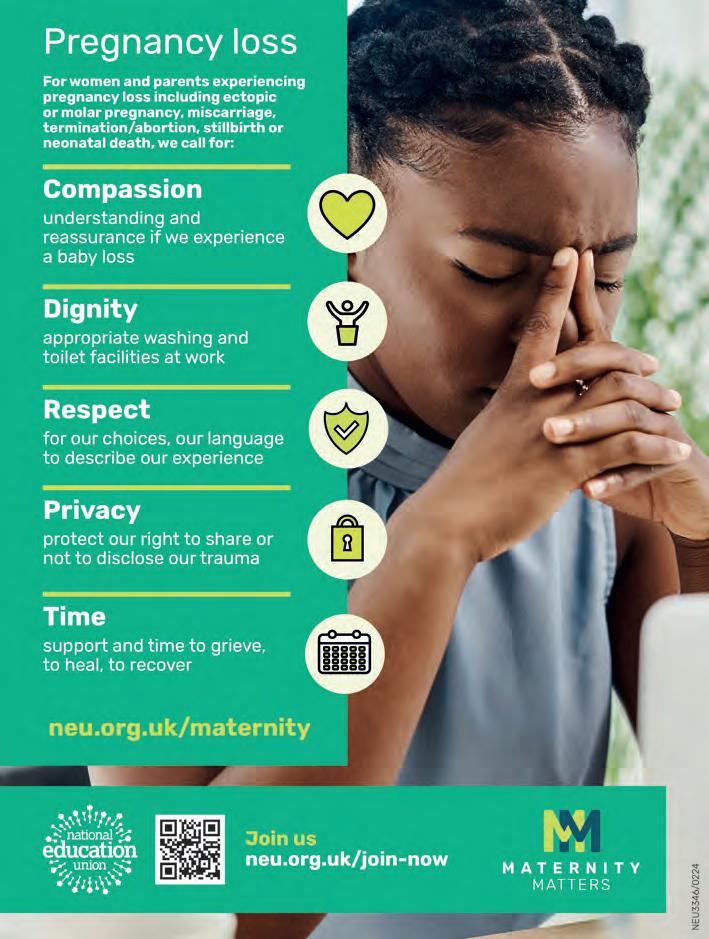
The NEU has produced a poster that can be displayed in workplaces as part of a set of resources designed to create a supportive environment for staff affected by pregnancy loss
says Amy. “My message, whenever I work with heads and senior leadership members, is that everyone is different and they need to just be kind. If people are struggling with pregnancy, or any kind of maternity issue, talk to them about what they want. If you aren’t sure, you can always talk to the NEU.
“The benefit for leaders of having a policy in place, and making sure staff know it is there, is that they can read it and know straight away what leave they are entitled to and so on. The best thing
to come out of all the horrible things I went through, apart from my children obviously, is that I have been able to contribute to something that will protect the NEU’s membership of half a million people.”

lead. The magazine for NEU Leadership members 21 Maternity Matters
‘Pay levels can’t fall further behind’





 Daniel Kebede General secretary, National Education Union
Daniel Kebede General secretary, National Education Union
neu.org.uk
facebook.com/ national education union
NEUnion
THIS General Election year, the Government has made it clear where its priorities lie.
In his spring Budget, Chancellor Jeremy Hunt had the chance to show that he was listening to concerns about the chronic underfunding of education.
He had the chance to show you that he understood the unsustainable pressures on school and college leaders, pressures that threaten to paralyse the profession.
e stubborn recruitment and retention crisis. e dearth of specialist subject teachers. e desperate shortage of support sta and special educational needs co-ordinators to coordinate good support for pupils who need it. e burgeoning class sizes. e dangerous state of crumbling school buildings.
But, once again, Jeremy Hunt o ered nothing to solve the problems in our schools and colleges. His Government likes to talk a good game. In October, the Prime Minister said that education was “the best economic policy” but hasn’t put a penny extra towards it since.
e NEU’s vital School Cuts campaign highlights the inescapable fact that 70 per cent of schools have less funding in real terms than in 2010.
Despite the worst cost-of-living crisis in a generation, the rising fuel bills and soaring costs you deal with every day, most schools have less to play with than 14 years ago.
His Budget message is that he wants you to keep doing more and more with less and less. But that’s just not sustainable.
Even after his budget announcement of £105 million for special free schools, the Chancellor plans to cut capital investment in education by more than ten per cent in cash terms next year –down from £7 billion to £6.2 billion.
e Government needs to face the facts. ese are major real-terms cuts in school and college funding.
ere are huge pay cuts against in ation for teachers and support sta , making it just too di cult for you to retain the sta you need.
Many schools are in de cit, with class sizes at record levels and a crisis in SEND funding.
While Government ministers spout platitudes about excellence and ratchet up expectations about student progress, you must deal with rising pupil needs, complex challenges on attendance and less support from local authorities on SEND.
It is why we are determined to cut through to
“Despite the worst cost-of-living crisis in a generation, the rising fuel bills and soaring costs you deal with every day, most schools have less to play with than 14 years ago.”
the public with the Schools Cuts campaign, and to make our campaigns count – on Ofsted, workload and accountability. Ofsted is under pressure like never before and we’ve been proud to sponsor the Beyond Ofsted inquiry, chaired by Sir Jim Knight, to scope detailed and workable alternatives for MPs.
e NEU leaders who gathered in London at our NEU Leadership convention last month left inspired to shape our campaign and to play a role in working together to secure better, fairer national policies.
As you read this, we are awaiting the results of a preliminary ballot of teacher members in England, in pursuit of a fully funded, above-in ation pay increase, and funding for additional sta ng.
A preliminary ballot of NEU support sta members is also underway.
We know that strike action must never be taken lightly. But the stubborn retention crisis is too serious for the profession. Pay levels can’t fall further behind and a path back to pay restoration for leaders and teachers is essential. It’s a good investment – it will reap multiple bene ts.
We must advocate for better policies and make the case that change to Ofsted, to accountability and for a wider vision of education, will retain more sta , save money and help children and young people achieve.
Following the ballot, the union will consider what campaign strategy is required. I was pleased to meet some of the NEU Leadership members at our recent conference and want to see you play a greater role in the union and our strategy.
ank you for being part of NEU leaders. Keep a look out for CPD, events and actions designed for you.
22 lead. The magazine for NEU Leadership members
Final
word



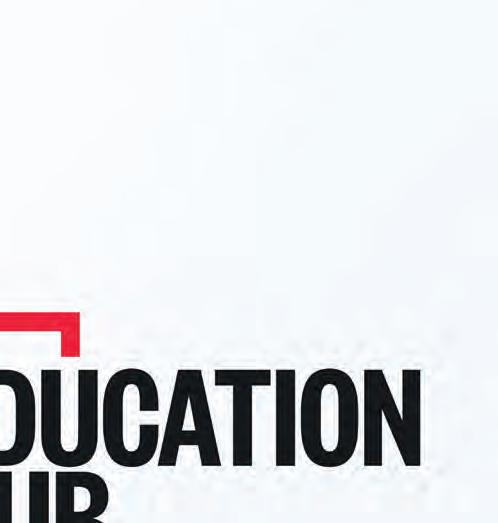






















































 Daniel Kebede General secretary, National Education Union
Daniel Kebede General secretary, National Education Union









